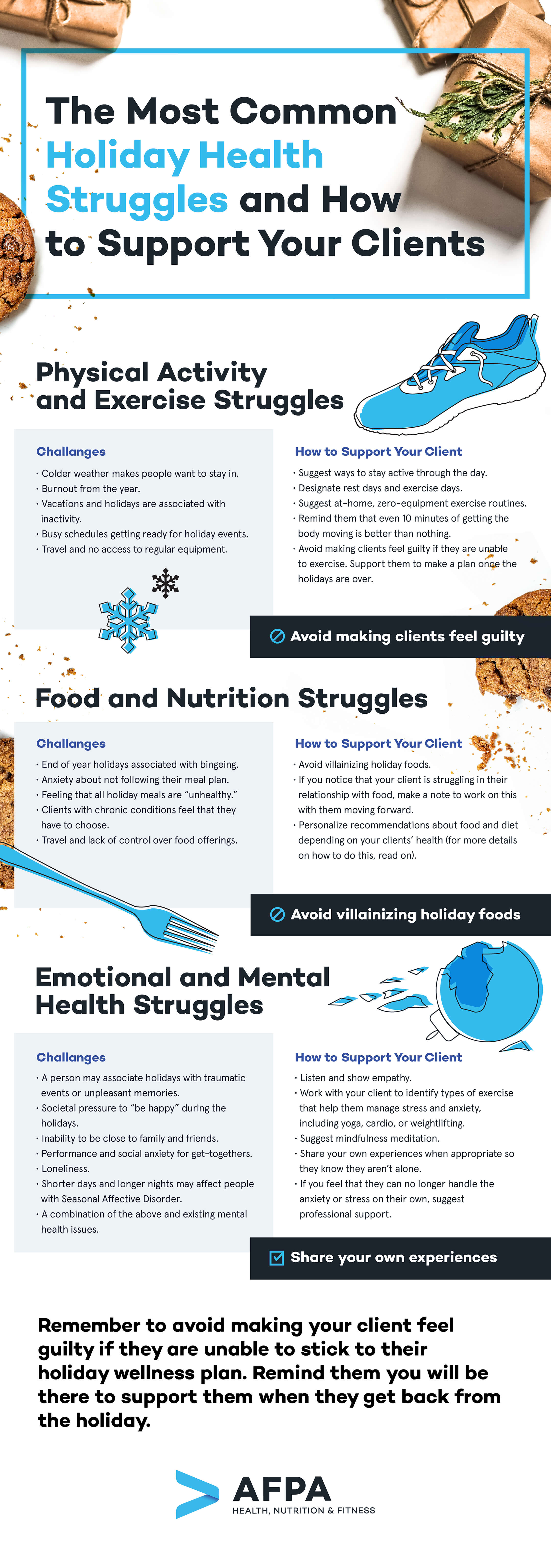For many people in the US, the stretch of time from Thanksgiving to New Year’s looks quite different from the rest of the year. There are more irregular schedules, (hopefully) more days off, and usually more activities related to prepping for the holidays.
The irregularity of the holidays usually means that your clients aren’t always on their game. Their exercise, nutrition, and wellness goals often take a back seat as they settle into the end of the year, whether that means preparing for an elaborate holiday bash or trying to hide from it all.
What are the most common holiday health struggles your clients may deal with, and how can you be a support for them?
Check out our quick-reference infographic below, and read on if you want to learn more.

{{cta(‘ec238631-a07b-4fd1-9cf0-fad43ad170e3′,’justifycenter’)}}
A Health Coach’s Role in Supporting Clients Through the Holidays
Adjust Goals
As we settle into the holiday season, take a moment to have pointed conversations with your clients about their expectations for the holiday season. How do they think their holiday priorities, to-do list, and emotions will affect their pre-holiday goals?
If needed, make new, more relaxed goals that realistically adjust to the season.
Be Honest About Your Availability
Just as your clients are living out the holiday season, you are too. You also have challenges and are working through them. Just as you had an honest conversation with your client to adjust goals, take a moment to think about your availability during the holiday season.
If you want to be there to support your clients, that’s great. However, make sure that you can follow through with that commitment as you are also searching for the perfect present, business planning for the new year, spending time with family, and getting some much-needed rest.
Communicate what your availability will be to your clients and make sure they know how and when you will be available to support them. Ultimately, make sure you follow through with your commitment.
Avoid Guilting or Disciplining Clients
There is always the chance that, even if you plan ahead and work with your client to adjust their goals, they simply won’t meet them. Not reaching their goals, especially after having committed to them with you, can be a source of guilt for clients.
As their health coach, you want to avoid contributing to the cycle of shame by disciplining them or making them feel guilty, which can compound anxiety and have negative physical and emotional repercussions. It can also negatively impact the honesty and sense of trust that is important in a coach-client relationship.
How to Support Your Clients Through the Most Common Holiday Health Struggles
As a holistic health coach, you will work with clients in aspects of their physical health and emotional health. The holiday season may be a challenge for your clients as well as for you. Here are some ways you can support them in the areas of nutrition, exercise, and emotional health.
Exercise and Physical Activity
Some of your exercise-loving clients will have no trouble keeping up with their exercise regimen throughout the holidays. For these clients, their frustration may come from having to prioritize other holiday events and activities over exercising.
Most people, however, will struggle with the opposite situation. The business, excitement, or emotionally draining aspects of the holiday season affect their motivation or ability to stay active.
Keep in mind that physical activity, which is movement throughout the day, may have to take priority over exercise, which is a planned activity with a set time.
Physical Activity and Exercise Struggles
- Colder weather makes people want to stay in.
- Burnout from the rest of the year
- Vacations and holidays are associated with inactivity.
- Busy schedules getting ready for holiday events
- Travel and no access to regular equipment
How to Support Your Client
- Suggest ways to stay active (playing with children, walking the dog, taking the stairs, parking far away, doing chores).
- Designate rest days and exercise days that are realistic with holiday responsibilities.
- Suggest at-home, zero-equipment exercise routines.
- Remind them that even 10 minutes of getting the body moving is better than nothing.
- Avoid shaming clients if they are unable to exercise. Encourage them to pick it up again after the holidays.
Food and Nutrition
This can be a sensitive topic for anyone during this time. The presence of a toxic diet culture in a season where food is closely associated with feelings and memories can cause significant anxiety when it comes to eating.
As health coaches, we need to work to shift away from a culture where we feel anxious about food and eating. Restrictive diets are more likely to lead to bingeing and are not conducive to long-term health behavior change.
At the same time, we need to adjust goals for clients who have or are at risk of a chronic disease that is directly affected by even short-term changes in diet. For a person with type 2 diabetes, for example, one night of filling up on sweets and baked goods could mean that they end up in the hospital, which is very unlikely in someone without a metabolic disorder.
Below we make some suggestions for how to adjust goals for clients with different needs.
Food and Nutrition Struggles
- End of year holidays associated with bingeing
- Anxiety about not following their meal plan
- Feeling that all holiday meals are “unhealthy”
- Clients with chronic conditions feel that they have to choose.
- Travel and lack of control over food offerings
How to Support Your Client
If your client is generally healthy:
- Avoid restricting certain foods, as this can encourage an unhealthy relationship with food.
- Remind them to focus on balanced meals.
- Remind them to listen to their bodies’ needs.
- Ask them to list non-food aspects of the holidays they are looking forward to, and encourage them to focus on those.
- If they desire, work with them to identify holiday recipes that meet their nutrition goals.
If your client has or is at risk of a chronic condition acutely affected by diet (like heart disease or type 2 diabetes):
- Encourage them to focus on aspects of the holidays, not only the food.
- Remind them of the effects that eating patterns have on their health.
- Have a conversation about their worries and barriers.
- Work with them to create or find delicious holiday meal recipes that fit their dietary needs.
- Encourage them to “test” healthy holiday recipes beforehand.
- If your client approves, work with family members to get everyone on board with the holiday meal plan.
Finally, it is important to avoid shaming clients for their food choices. If you notice that your client is struggling in their relationship with food, make a note to work on this with them moving forward.
Emotional and Mental Health
For most people, the holiday season is one that is defined by strong emotions. Those emotions could range from overwhelmingly positive to deeply negative. For some people, the smell of pine may bring joyful memories of Thanksgiving at their grandparent’s house, and for other people, just the sight of holiday decorations could remind them of a traumatic event.
Additionally, the holiday season brings about stressors related to budget, holiday shopping, and tight deadlines. COVID-19 may also cause people anxiety about getting together with loved ones.
As a health and wellness coach, it is important to be mindful that everyone experiences the holiday season differently, and we mustn’t assume that it is joyful or busy for everyone.
Emotional and Mental Health Struggles
- A person may associate holidays with traumatic events or unpleasant memories.
- Societal pressure to “be happy” during the holidays
- Inability to be close to family and friends
- Loneliness
- Performance and social anxiety for get-togethers
- Shorter days and longer nights may affect people with Seasonal Affective Disorder.
- A combination of the above and existing mental health issues
How to Support Your Client
- Provide the opportunity for your client to share what their holiday season will look like.
- Adapt your health and coaching plan to meet their needs.
- Listen and show empathy.
- Work with your client to identify types of exercise that help them manage stress and anxiety, including yoga, cardio, or weightlifting.
- Suggest mindfulness meditation and de-stress techniques.
- Co-construct commitments to practice sleep hygiene.
- If your client is stressed about COVID-19 risk and restrictions, suggest these ways to help them cope with COVID-19 related anxiety.
- Share your own experiences when appropriate so they know they aren’t alone.
- If you feel that they can no longer handle the anxiety or stress on their own, suggest professional support.
Are you in love with the holiday season and having trouble imagining why it might not be a source of joy for others as it is for you? Read this article if you want to learn why the holidays might be a source of anxiety for some of your clients.
{{cta(‘e17f57ed-fee6-4add-8fb5-efa24892f727’)}}



